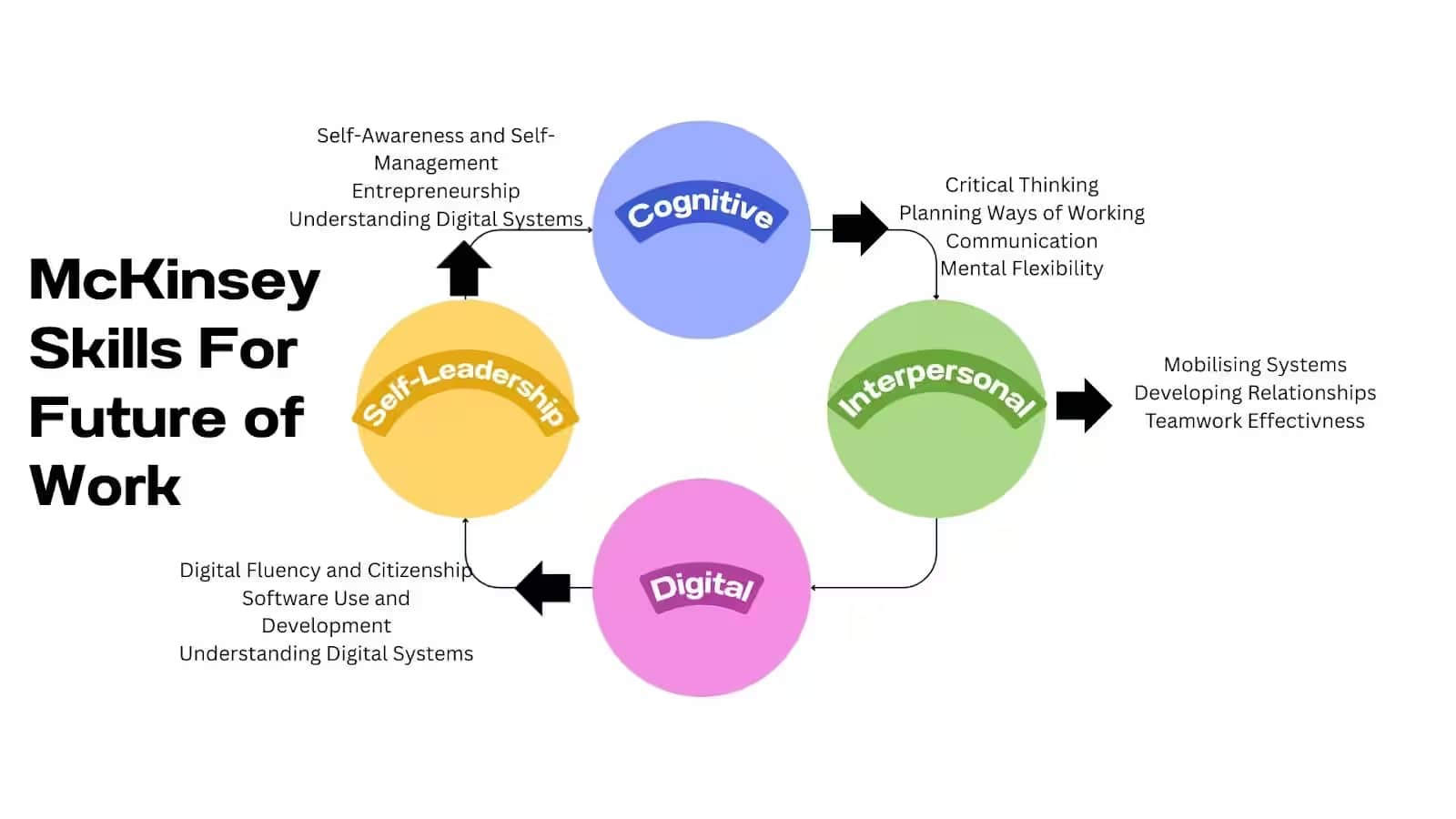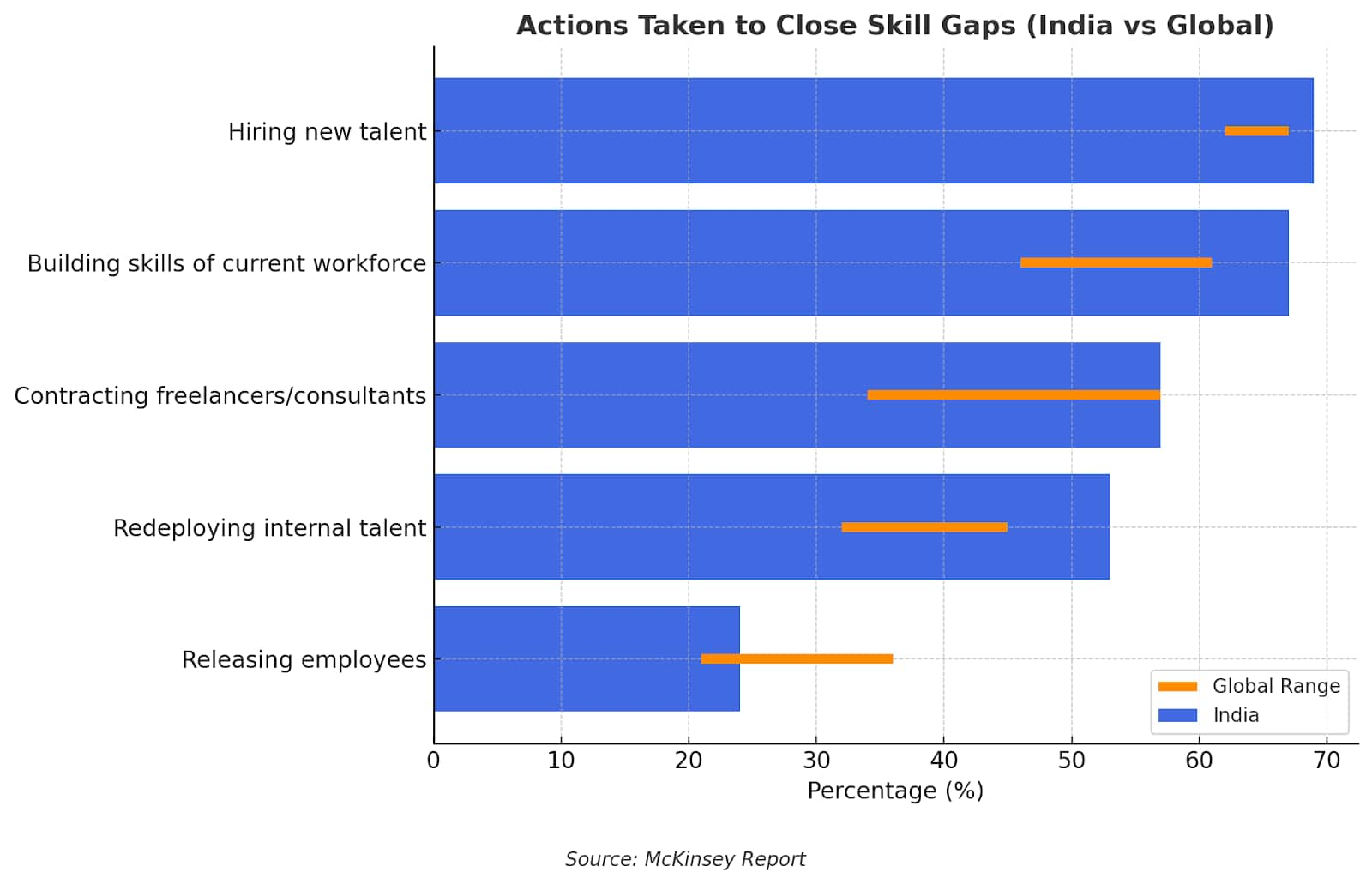IMI Bhubaneswar PGDM Admissions 2026
Phase 02 Applications Window Closing on 23rd January 2026 | 100% Placements Record | Highest CTC 40.31 LPA | Average CTC 12.74 LPA | Median CTC 12.48 LPA
The work environment is changing rapidly. According to the McKinsey report “The Skills Revolution and the Future of Learning and Earning”, 56 foundational skills are divided across 13 groups that will define the employability and career success in the future. The major components of these skills include- Cognitive, Interpersonal, Self-Leadership, and Digital. An MBA is no longer about just learning management theory- it is about building these future-ready skills.
This Story also Contains
The research conducted by McKinsey was to identify distinct areas of talent (DELTAs). They tested them out in a survey in which there were 18,000 respondents in 15 countries. The research identified 56 skills that will help professionals succeed in their future careers. They divided the 56 DELTAs across four broad categories (Cognitive, Interpersonal, Self-Leadership, and Digital), further divided into 13 skills.

Cognitive Skills are the foundation of problem-solving, communication, and adaptability. MBA programmes are designed to challenge students with complex case studies and projects that play a major role in strengthening these abilities. In the table below, we have discussed relevant MBA courses for each skill identified by McKinsey and Company.
Phase 02 Applications Window Closing on 23rd January 2026 | 100% Placements Record | Highest CTC 40.31 LPA | Average CTC 12.74 LPA | Median CTC 12.48 LPA
NAAC A++ Grade | MBA program graded A** (National) by CRISIL | AACSB, ACBSP and BGA Member
| Cognitive Skills | Relevant MBA Courses |
|---|---|
Self-Awareness and Self-Management | MBA Finance, MBA Business Analytics, MBA Banking, MBA Investment Analytics, MBA Project Management, MBA Investment Banking |
Planning and Ways of Working | MBA Operations, MBA Construction Management, MBA Technology Management, MBA in Innovation, MBA in Marketing, MBA Telecom, MBA Hospitality, MBA in Entrepreneurship |
Communication | MBA in Communication, MBA Entrepreneurship, MBA in HRM, MBA in International Business |
Mental Flexibility | MBA in Fashion Management, MBA in Agri-Business, Executive MBA, Distance MBA |
Why this Matters- Employers in Finance, Consulting, and Analytics value graduates who can think critically, communicate effectively, and adapt quickly. Programmes such as an MBA in Business Analytics or an MBA in Finance directly deliver these skills.
In a diverse work environment, having accurate interpersonal skills such as teamwork, negotiation, and empathy is essential. MBA programmes often involve group projects, leadership labs, and cross-cultural case studies to develop these skills. Below, we have mentioned the interpersonal skills for the future of work as identified by McKinsey, and relevant MBA programmes help build these skills.
| Interpersonal Skills | Relevant MBA Courses |
|---|---|
Mobilising Systems | MBA in General Management, MBA in HRM, MBA in Foreign Trade, MBA in Corporate Management, MBA in Telecom Management, MBA in Logistics |
Developing Relationship | MBA in Healthcare, MBA in Banking, MBA Finance, MBA in Communication and Media, MBA in Sustainability Management |
Teamwork Effectiveness | MBA in Family Business, MBA in Sustainability, MBA in Marketing |
Why this matters: Whether it is an MBA in HR, MBA in Hospitality or MBA in International Business, the ability to inspire trust, negotiate globally, and build strong relationships is crucial for leadership roles.
Self-leadership means taking responsibility for personal growth, leading through uncertainty, and building resilience. An MBA helps students develop confidence and entrepreneurial thinking skills.
| Self-Leadership Skills | Relevant MBA Courses |
|---|---|
Self-Awareness and Self-Management | MBA in Leadership, MBA in Healthcare, MBA in Rural, MBA in Business Management, Executive MBA, MBA in FinTech |
Entrepreneurship | MBA in Entrepreneurship, MBA in Innovation and Entrepreneurship, MBA in Fashion Management |
Goals Management | MBA in Operations, MBA in Agri-Business, MBA in Environmental Management, MBA in Energy |
Why this matters: Specialisations such as MBA in Entrepreneurship, MBA in Sustainability, and MBA in Rural Management equip the students to cope with uncertainty, build innovative thinking, and build resilience that every employer values.
Due to technological shifts, digital literacy has now become a core business skill. MBAs that focus on data, technology, and smart systems often give students an edge in industries such as consulting, fintech, and e-commerce.
| Digital Skills | Relevant MBA Courses |
|---|---|
Digital Fluency and Citizenship | MBA in Digital Marketing, MBA in IT, Distance MBA, Online MBA, MBA in E-Commerce, MBA in Telecom, MBA in Business Analytics |
Software Use and Development | MBA in Data Science, MBA in AI, MBA in Big Data Analytics, MBA in IT Systems, |
Understanding Digital Systems | MBA in Technology Management, MBA in Telecom, MBA in FinTech, MBA in Consultancy |
Why this matters: With careers experiencing a digital shift, courses such as MBA in Business Analytics, MBA in Artificial Intelligence, MBA in FinTech, and MBA in Digital Marketing directly prepare students with the digital skills new-age companies require.
McKinsey’s research identified eight technological changes that are reshaping the learning experience of students.
Group Work
Connectivity and Community Building
Augmented/Virtual Reality
Machine Learning-Powered Teaching Assistants
AI Adaptive Course Delivery
Classroom Exercises
Classroom Interactions
Student Progress Monitoring.
McKinsey’s research shows that organisations worldwide are actively trying to bridge the skills gap by creating automation, AI, and changing business models. For India, the trends are promising and directly deal with the MBA graduates for the future-ready skills.
The chart below highlights the percentage of Indian organisations taking action compared to global regions:
Action Taken to Close Skill Gaps | India | Global Range | Insight |
Hiring new talent | 69% | 62–67% | India leads the world in hiring as the primary way to address skill shortages. |
Building skills of the current workforce | 67% | 46–61% | Indian firms invest heavily in upskilling, which aligns closely with MBA-driven learning. |
Contracting freelancers/consultants | 57% | 34–57% | India is among the top in leveraging flexible work arrangements to fill skill gaps. |
Redeploying internal talent | 53% | 32–45% | Indian companies prioritise mobility, moving talent into new roles where needed. |
Releasing employees | 24% | 21–36% | Layoffs are the least preferred solution in India compared to many global peers. |

With 69 per cent hiring and 67 per cent building skills, Indian firms prefer growth-oriented approaches over job cuts.
Opportunities in Flexible Work Models- Contracting 57 per cent shows rising demand for consultants and domain specialists, areas where MBAs have a huge opportunity.
Redeployment: Companies value professionals who can adapt and take on new roles- aligning with MBA graduates' multi-disciplinary training.
Low emphasis on Layoffs- Unlike North America or Europe, Indian organisations focus on talent retention and reskilling, which has a huge impact on ambitious MBA aspirants.
Briefly, India’s strategy shows that continuous learning and adaptability are at the core of workforce planning, making MBA specialisations that teach leadership, digital, and analytical skills more relevant than ever.
The McKinsey 56 skills framework proves one thing clearly: an MBA is one of the most effective ways to build these skills systematically. From critical thinking in an MBA in Finance, to good communication skills in HR, to digital fluency in MBA Business Analytics, each specialisation is a training ground for the future of work.
On Question asked by student community
The Jain Entrance Test (JET) 2026 for MBA admissions at Jain University is a multi-stage process designed to evaluate candidates' aptitude, communication skills, and subject knowledge. The written exam syllabus typically includes sections on Mathematical Skills, Data Interpretation, Logical Reasoning, Language Comprehension, and General Knowledge. After the written test, qualifying
Hello,
Yes, after completing a bachelor’s in pharmacy, you are fully eligible to appear for the MAH MBA/MMS CET exam.
For Eligibility Criteria for MAH MBA/MMS CET 2026 you can access mentioned link below:
https://bschool.careers360.com/exams/mah-mba-cet
Hope it helps.
Hello,
The MBA finance course teaches a student about the principles of financial management, accounting, investment analysis, etc. One can get into banking, insurance, MNCs, etc, industries.
The CBSMS offers a 2 year MBA program, having both full time and part time options. It has a seat capacity of 180
Yes the application for MBA cet is started and application form is live now
with this percentile, you can get into tier 2 or tier 3 college, the list of the few notable college is given below-
1) FLAME university, Pune
2) AIMS institute, Bangalore
3) Doon business school, Dehradun
4) Christ university, Bangalore
5) NIT Trichy
6) KIIT school of management, Bhuvneshwar
Ranked among top 10 B-Schools in India by multiple publications | Top Recruiters-Google, MicKinsey, Amazon, BCG & many more.
Among top 100 Universities Globally in the Times Higher Education (THE) Interdisciplinary Science Rankings 2026
Last Date to Apply: 10th Feb | Globally Recognized by AACSB (US) & AMBA (UK) | 17.8 LPA Avg. CTC for PGPM 2025
Highest CTC 30 LPA | #9 in Management Category by Times B-School | Merit-Based Scholarship Upto - 50 Crores
Highest Package 27.25 LPA | Top 100 Average package 16.65 LPA | AACSB Accredited | Ranked 52 by QS International | Last Date to Apply: 27th Jan'26
#36 in NIRF, NAAC ‘A’ Grade | 100% Placement, up to 30% meritorious scholarships